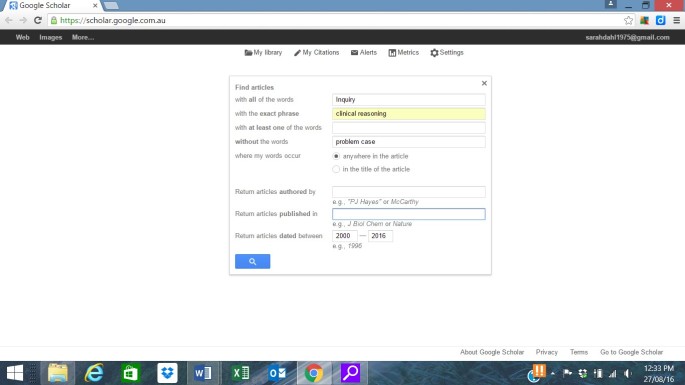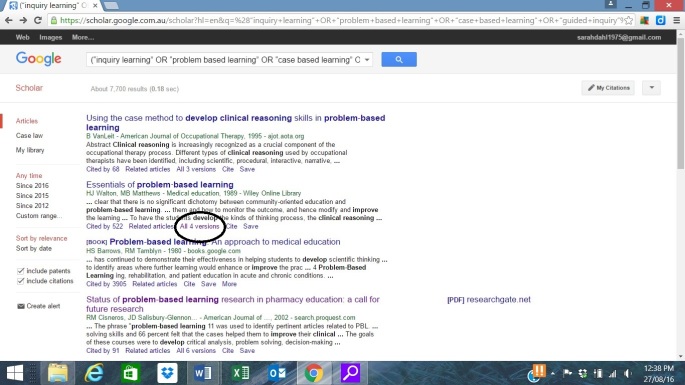I decided to focus my search on my first research question. I needed to formulate an answer to this question first, if I was going to suggest it to my colleagues as a pedagogical approach.
The first step is to identify the key words and phrases in my primary research question:
Does an inquiry learning approach lead to improvements in student clinical reasoning skills?
I performed a simple Google search on these terms with the aim of identifying synonyms that might assist my search. ‘Googling’ has become such a reflex action that I don’t even stop to consider starting my search anywhere else. Such is the global impact of this tool that its name has become a verb in the English lexicon. It is certainly a good place to start by performing a quick and simple search for key terms in order to get a feel for synonyms and alternative spellings.
This is the result of the synonym search. I could have added other terms as well, however a quick scan of the results showed that these were the most used terms and spellings. The tree roots are growing…

Diagram created by author
Using Boolean operators, parentheses and double quotes enables me to find relevant resources and to narrow the search in order to exclude irrelevant results. Below are some examples of my most successful complex search strings using these search techniques in Google:
| Search String | Results in Google | Comments |
| (“inquiry learning” OR “inquiry based learning” OR “enquiry learning” OR “problem based learning” OR “case based learning” OR “guided enquiry” OR “guided inquiry”) AND (“improve” OR “promote” OR “develop”) AND (“clinical reasoning” OR “clinical judgement” OR “clinical problem solving” OR “critical thinking”)
|
About 421,000 | Whilst my initial keyword and key phrase searches were returning millions of results, this complex search string has returned about 421,000 results. Still a huge and unmanageable amount, but it’s an indication to me that I have excluded a vast number of irrelevant results.
Some useful resources were returned on the first two pages, however many of the results relate to science education. |
| (“inquiry learning” OR “inquiry based learning” OR “enquiry learning” OR “problem based learning” OR “case based learning” OR “guided enquiry” OR “guided inquiry”) AND (“improve” OR “promote” OR “develop”) AND (“clinical reasoning” OR “clinical judgement” OR “clinical problem solving”)-science | About 94,400 | “Critical thinking” has been removed from the search string and I have excluded results relating to “science” by adding –science to the end of the search string. This search yields at least two useful resources on the first page which were buried in the last search results. |
| (“inquiry learning” OR “inquiry based learning” OR “enquiry learning” OR “problem based learning” OR “case based learning” OR “guided enquiry” OR “guided inquiry”) AND (“improve” OR “promote” OR “develop”) AND (“clinical reasoning” OR “clinical judgement” OR “clinical problem solving”) AND “health professional education” | About 9,250 | Adding the term “health professional education” yields results that are directly related to my professional context and also includes health professions other than dentistry. This is useful because other health disciplines such as Medicine have a large, strong educational research community which dental educationalists often draw upon. |
| (“inquiry learning” OR “inquiry based learning” OR “enquiry learning” OR “problem based learning” OR “case based learning” OR “guided enquiry” OR “guided inquiry”) AND (“improve” OR “promote” OR “develop”) AND (“clinical reasoning” OR “clinical judgement” OR “clinical problem solving”) AND “dental education” | About 7,740 | Replacing “health professional education” with “dental education” yields results that are directly related to my professional context. |
My journey using Google
I have noticed during my Google searches that on most pages, by the time I get past the first two or three pages of search results (the most relevant results according to Google’s algorithm) I’m already seeing articles that are not very relevant and are of dubious quality (questionable journals, poor English translations and articles and websites that only contain one of my key phrases). My experience of Google searches are often like this. The first page or two are usually the only pages with reasonably relevant search results. It’s not often that I go further than the third page of results before I give up reading. Even if the results were all relevant, who has time to look at tens of thousands of results? For me, this is the downside of Google. The number of sites that it searches is so big that the number of results is unmanageable. Having said that, because it is searching so many sites, the variety of the search results is fantastic. Not only will Google return some useful public access journal articles, I also found a couple of good websites and Google always has the potential to find videos or images as well.
I think I have exhausted my search using Google now. My searches are starting to yield the same results even after tweaking the search string. Also, the student and higher education employee in me is dubious of the quality of many of the results that appear to be scholarly.
Now is probably a good time to move on to Google Scholar.
Below, is a summary of my successful searches (and one unsuccessful search!) using Google Scholar:
| Search String | Results in Google Scholar | Comments |
| (“inquiry learning” OR “inquiry based learning” OR “problem based learning” OR “case based learning” OR “guided inquiry”) AND (“improve” OR “promote” OR “develop”) AND (“clinical reasoning” OR “clinical judgement” OR “clinical problem solving” OR “critical thinking”) | 0 | I’ve decided to remove the word “enquiry” from my search strings in Google Scholar because I don’t believe it has added anything to my search. However, as I try to use a very similar search string to my first successful Google search (above) I discover that Google Scholar has a 256 character limit! The most annoying thing is that I didn’t realise at first because it cut my search off without warning me! |
| (“inquiry learning” OR “problem based learning” OR “case based learning” OR “guided inquiry”) AND (“improve” OR “promote” OR “develop”) AND (“clinical reasoning” OR “clinical judgement” OR “clinical problem solving”) | About 7,690 | This an example of a successful similar search with a smaller number of characters. The first thing I notice is that the number of results returned is far fewer than the same search string used in Google (Google returned 138,000 results with this search string). However, the relevance and reliability of the results is greater. |
| (“inquiry learning” OR “problem based learning” OR “case based learning” OR “guided inquiry”) AND (“improve” OR “promote” OR “develop”) AND (“clinical reasoning” OR “clinical problem solving”)-science | About 6,750 | Unlike with Google, removing the term “science” had very little effect on the number of results returned and I’m not sure why. But again, the relevance and reliability of the results is greater. |
| (“inquiry learning” OR “problem based learning” OR “case based learning” OR “guided inquiry”) AND (“improve” OR “promote” OR “develop”) AND (“clinical reasoning” OR “clinical problem solving”) “health professional educ” | About 6,170 | Adding the term “health professional educ” yields results that are directly related to my professional context and also includes health professions other than dentistry. This is useful because other health disciplines such as Medicine have a large, strong educational research community which dental educationalists often draw upon. Google Scholar forced me to truncate the word “education” (the character limit strikes again!) however this had no effect on the search results. |
| (“inquiry learning” OR “problem based learning” OR “case based learning” OR “guided inquiry”) AND (“improve” OR “promote” OR “develop”) AND (“clinical reasoning” OR “clinical problem solving”) “dental education” | About 582 | Replacing “health professional education” with “dental education” yields results that are directly related to my professional context. |
| Inquiry “clinical reasoning”
-problem -case |
About 410 | I noticed from my Google and Google Scholar searches that most of the relevant results were related to problem based learning and case based learning. However, now I would like to find out whether other types of inquiry learning have been shown to improve clinical reasoning skills. Using the advanced scholar search (image below) I was able to exclude the words “problem” and “case” and restrict the year range to 2000 – 2016. This particular search yielded a small number (comparatively speaking) of very interesting results! |

Example of Advanced Scholar Search (Image created by author)
My journey using Google Scholar
Apart from the character limit stumbling block, my search using Google Scholar has been reasonably successful. The ‘advanced scholar search’ function is quite helpful. Another feature I really liked was that Google Scholar doesn’t present duplicates, but rather, indicates that the article is available in several versions:

My tree roots have established themselves. Now it’s time to move on to A+ Education!

Hi Sarah. Firstly, I loved your concept of the tree and foundation roots. I really think that this aligns so nicely with inquiry learning as we are developing skills that will underpin our research for years to come! You have such detailed search strings! I like how you have used a number of popular terms for inquiry learning in each search to ensure that you are not limiting your results. My searches was not as descriptive, so you inspired me to go back and have a play around with additional words – with some great results. Your note on character limits helped me avoid making the same error, so thank you for sharing. You may find the PRE/n option in Proquest useful. When I used this function for inquiry Pre/1 learning, I was able to bring up inquiry learning, learning based learning, inquiry guided learning. Good luck with the rest of your study!
LikeLiked by 1 person
Thank you for your feedback Amy! I will give the PRE/n option a go 🙂
LikeLike
Hi Sarah, I love your analogy of the tree to explain the inquiry process! I also had difficulty with my A+ Education search and I really liked how you browsed the publications to see if a specific journal was listed. This is great to keep in mind for future searches. Unfortunately I couldn’t use this strategy for my topic as there isn’t one specific journal that would be of use. Wondering if you could have taken your search strings further with the use of an asterisk with inquiry, instead of stating the different variations of “inquiry learning”, “inquiry-based learning”, etc. Another suggestion is to make your inquiry questions more consistent throughout your blog and stand out a bit more? Maybe a different colour, all bold, or use a heading style for all of your inquiry questions. This would make it easier for the reader to see as it would clearly stand out on every page/post and the progression of your inquiry search would be made more obvious. Best wishes for the rest of your study.
LikeLiked by 1 person
Thanks for your suggestions Yana! Making my research questions stand out more is a good idea I think.
LikeLike